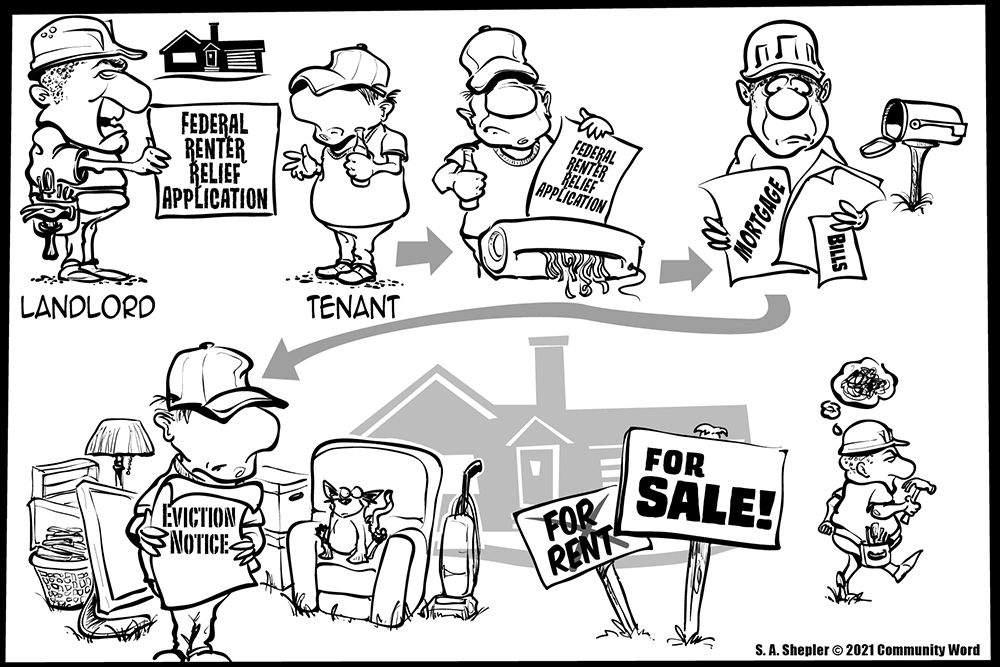
It’s easy to understand workforce diversity helps with product development because it takes into account all demographic perspectives. Mazda neglected to take into account the Spanish population when it named a car model the Mazda Laputa. Laputa can be translated into the woman who sells her body for sex. Bad and costly decision.
Diversity is just as essential when it comes to developing public policy. The goal of helping renters avoid evictions during the pandemic was worthwhile. Implementation of the eviction moratorium was flawed and could result in greater homelessness. The government needed to understand the dilemma it created for small landlords.
With $46.5 billion allocated for the program, only about $5 billion had been disbursed 12 months into the eviction moratorium. None of that financial relief came to Sherry Cannon. Her tenant did not even apply for assistance. That left landlords like Cannon personally subsidizing a government program designed to help someone else.
Over 60% of renters who would qualify for assistance had not even applied, according to a report in The New York Times.
Cannon believes the structure of the rental assistance program was problematic. Since the money does not go to the tenants but to the property owners, tenants have no incentive to fill out the application.
When Cannon completed an application in April for 12 months of unpaid rent, the government threw the application out because her tenant had not completed the tenant portion of the application.
Cannon owns a lovely rental home on a tree-lined street in the west bluff. She had no plans to be a landlord but when her husband died, that job fell to her. When her tenant stopped paying the rent, the tenant couldn’t be evicted because of the moratorium, but the mortgage still had to be paid. And the property taxes. And the combined sewer overflow fees.
The tenant refused to fill out the paperwork for rent relief because the money would not go to the tenant, it would go to the property owner. The tenant had no incentive to fill out paperwork.
For the past 18 months, Cannon has received no rent checks and the tenant has refused to allow any housing inspections or even seasonal maintenance for the furnace.
When Cannon contacted her Congressional representatives, she was told the money for rent relief was allocated.
“But it’s inaccessible to me,” she said. “I’m a widow. I’m retired. The rental assistance is not helping me. I’m told I can’t evict my tenant but I’m still being made to pay. The process is wrong and unfair.”
Cannon cites an article from Newsweek about a woman, an Air Force veteran, who derived income from three rental properties. When the tenants stopped paying rent, the woman ended up living in her car with her child.
Lifting the moratorium means Cannon can go to court to start eviction.
“But I will have to pay court fees and pay to remove her from my property,” Cannon said.
In addition, extensive damage has been done to the home, but the tenant is refusing to allow workers in for repairs.
“The government had the PPP dollars to help big companies, but what about me,” she said.
Cannon said she will have repairs done and sell the property when her tenant is finally forced to vacate. She predicts many small landlords who supplied critically needed housing for low-income people will pull the plug, get out of the rental business and sell. That will result in fewer homes available for rent.
“Then where will all these people go?” Cannon said.
Her husband had liked being a landlord and supervised rent, repair and ongoing work.
“He’d be horrified to see this today,” she said.
The reality is the moratorium had to end at some point. The Supreme Court ruling in late August finding the Centers for Disease Control and Prevention and the Biden administration lacked the authority to further extend the moratorium may result in the eviction of roughly 3.5 million people behind in their rent according to an estimate by the Associated Press. And those evictions will come when more landlords like Cannon will be selling and getting out of the rental business because of the damage inflicted on them by the way the program was structured.

Recent Comments